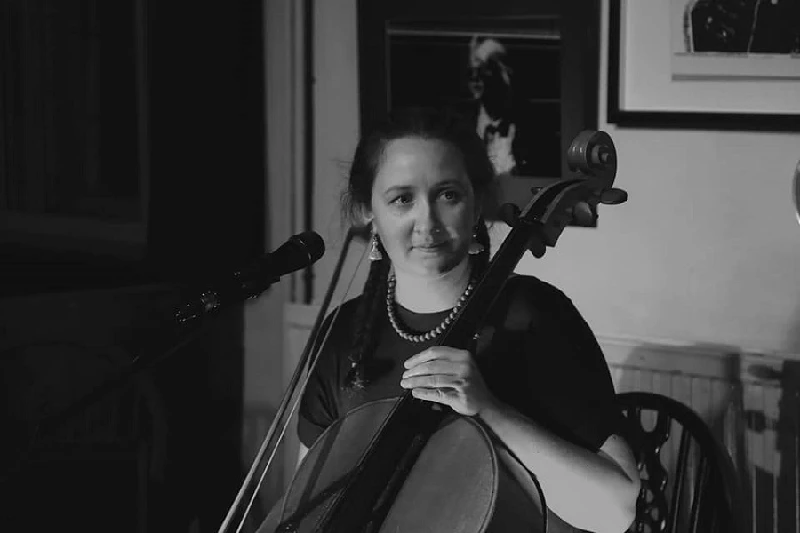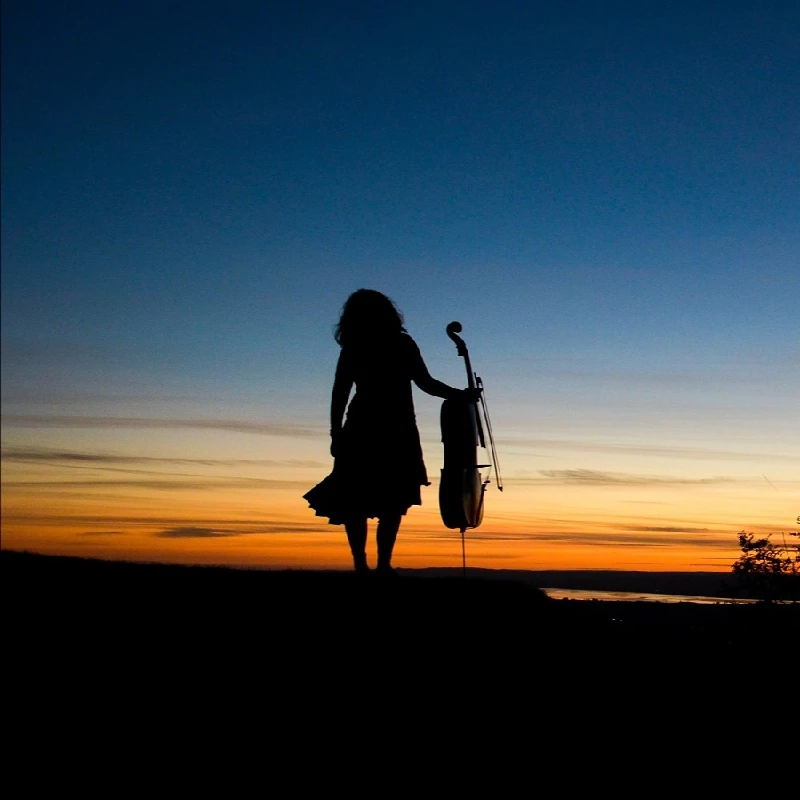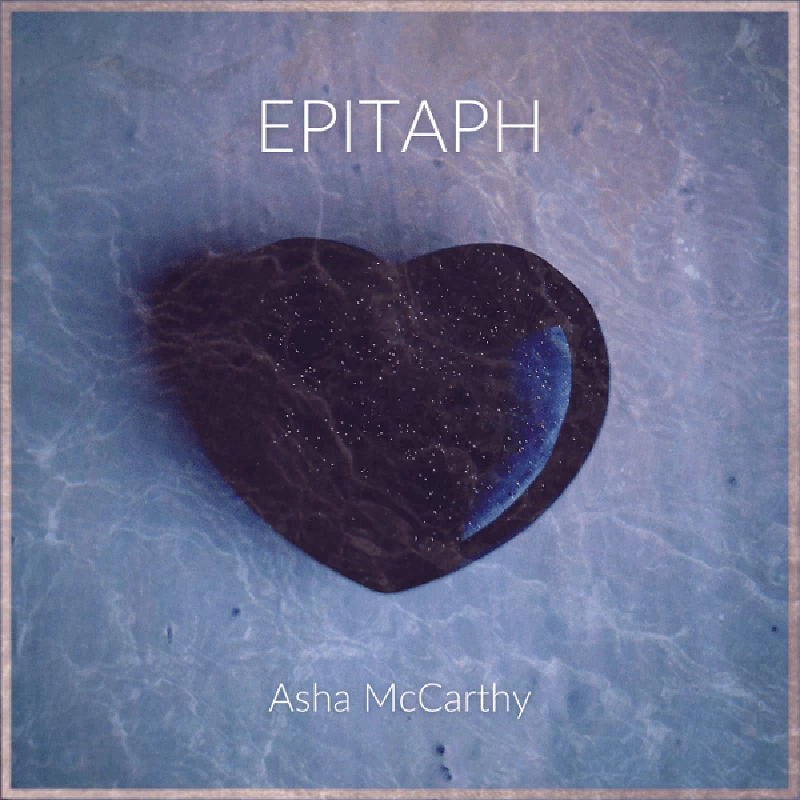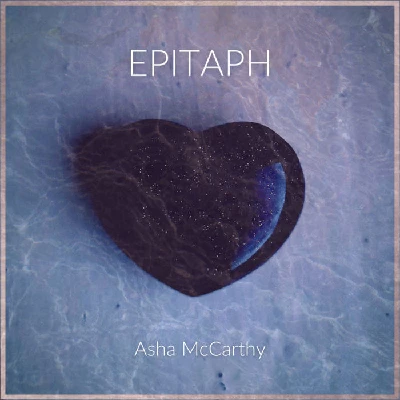Multi-instrumentalist Asha McCarthy recently released her debut album ‘Epitaph’ and I’m embarrassed to say that in my review I said that she and her music were new to these ears. Even when putting a few questions to Asha recently it still didn’t register that she had played a major part in some of the most affecting, beautiful music I’d ever heard before ‘Epitaph’. So I’d like to take this opportunity to put that right here: Asha played a great part in two of my favourite albums of all time – the first two albums from singer/songwriter Hattie Briggs (‘Red & Gold’ and ‘Young Runaway’) and her cello was also heard on another favourite, Emma Ballantine’s ‘Tourist’ EP. All of which has me wondering what other songs Asha has contributed to which are also on the special shelf. Asha’s motivation for ‘Epitaph’ was the traumatic birth of her daughter and the postnatal problems she experienced. There are so many new mothers who will find comfort in ‘Epitaph’, so many who will relate to the remarkable songs that Asha creates. But it’s not just an album that will appeal to those in similar circumstances. Parts are so relaxing, so soothing that if initially it’s a mother struggling with a newborn who finds solace in the songs, it won’t be long before partners reach for ‘Epitaph’ during those long nights when sleep is needed but a little life needs you more. There are many layers to ‘Epitaph’ and it’s truly one of those albums which draws the listener in a little more with each play, revealing a little more of its beauty as the music becomes more familiar. It’s a compelling listen, one of those albums you have to take in completely without skipping tracks. Asha’s vocals are comforting but combined with her skill on the array of instruments she employs she creates music that’s comforting, relaxing and inspiring. Just a cursory listen to the opening track, ‘Drift’, will tell you how moving this music is. Pennyblackmusic: Firstly, congratulations on making one of the most beautiful albums of 2021. When did you decide that music was going to be your path? Asha McCarthy: It just sort of evolved that way, but I’ve always just wanted to do music. I love Hindustani classical music and had always wanted to learn, and after my degree I had the amazing opportunity of studying in Delhi with Saskia Rao. I learned so much from her and Shubhendra Rao, and it’s still my dream to get practicing Indian music properly again. PB: You play a host of instruments on ‘Epitaph’ but the cello is probably the instrument you are instantly associated with. When sketching out your songs which is your instrument of choice? AM: Actually I usually write on the guitar as I find ideas come to me easier like that! But sometimes at the piano or sitting at the computer with a Midi keyboard. PB: You recorded, mixed and produced the album. Apart from Misha Mullov Abbado’s bass playing it really is a ‘solo’ album. Did you ever have thoughts about calling in an outside producer? How difficult was it to produce the album yourself? AM: For a long time I’ve wanted to make an album, and I just really wanted to produce it myself. I do a lot of collaborations and session work or string arrangements for other people’s music where I’m not making creative decisions, so I am happy collaborating! But I knew I didn’t want to hand the production over for my own music. I had a very clear vision for it and enjoy the creative process of building the arrangements and textures, but I always felt like I didn’t have the skills to do the recording and mixing so felt stuck. I did Isobel Anderson’s amazing course to help with those skills, and I then found recording at home so much easier as I could just think of another harmony for example and immediately record it and try out other things, recording became part of the creative process. The production side was just so fun and a pleasure, but the mixing was a bit more difficult as I don’t have a huge amount of experience so spent longer than I should tweaking bits to get the sound I wanted. The decision to do it like this though was also to do with practical issues and limitations, as I was at home with a toddler in a lockdown, so needed to have recording fit in with that. PB: Given your skills on various instruments and an obvious flair for producing, would you consider using other musicians or a producer for future releases? AM: Oh, thanks for saying that! Yes, I definitely would. I know so many amazing musicians, engineers and producers, I want to work with them all. Realistically, though, I would like to keep producing or co producing. It’s such a part of the fun for me. It was great working with Lukas Drinkwater who mastered the album and also helped at the final hurdle with mixing, and it was such a relief to have another person’s ears on it, and see what it looks like when someone is really skilled and practiced at mixing, so next time I’d work with someone for the mixing, as it would make the whole process a lot faster. PB: It’s impossible to pin your sound down to one specific type, maybe you’ve created a new genre. But have you been influenced by other artists? AM: I find it hard to answer this question as there are so many musicians that I love, and I’m sure I’ve been influenced by them all. listened to 'The Gloaming' a lot and love the way they are playful, experimental, yet respectful of traditional music. And I love Bjork’s experimentalism and pushing boundaries in production. PB: Knowing that ‘Epitaph’ has given new mothers hope and inspiration during those challenging months after childbirth most be one of the most rewarding aspects of the album. AM: Yes, I hope it is reaching people who are in that stage of motherhood and is relatable like that. there has been some lovely feedback from people. PB: Are you surprised how warmly it has been appreciated? Even those who can never go through the traumas find solace in the songs. AM: Yes, I really wasn’t sure if this would have a wider appeal, as it’s such specific subject matter, and especially the lullabies. But actually I do think we all need lullabies in our lives, and the conviction that it is possible to come through hard times. PB: How did you find the time during what must have been a hectic and demanding period in your life? AM: It was difficult. The recording was done in a really simple way at home and I had to have a “good enough” attitude of “that’ll do” rather than being perfectionist. Which was a good thing for me, otherwise I might never have got an album out at all. Time was the big limitation: all the editing and mixing was done on headphones after I’d put my daughter to bed and the recording was done while she was being looked after by her dad. PB: How long did the album take to complete from the initial idea to production? AM: From beginning, recording the first song, to the album’s release was about a year. Some weeks I had lots of time to spend, and there were other weeks where I didn’t even touch it. PB: Is there one song that means more to you than the others? AM: I think ‘Epitaph part 2’ means the most to me as it came out of such a profound experience and is my epitaph. PB: Have you planned any performances or have you had to postpone any that were booked? AM: I haven’t had to lose any planned gigs so far – fingers crossed – but I hesitate to call it lucky, as it’s been so unlucky for the last two years to not be able to do any gigs at all. I’ve done a few since the album has come out, which has felt amazing, I feel like a part of me has been missing and now I can remember who I am again. PB: If you do intend to play ‘Epitaph’ live do you already have in mind the musicians you would have accompany you? Would it be impossible to tour the album solo? AM: I did an album launch gig in Stroud and have done a few gigs since then. I actually do a lot of live looping so have made some inventive arrangements of the album’s songs, with multiple instruments [on loops], and with musicians singing harmonies on a few of the songs that can’t use looping. PB: What is next for you now? Any plans to write or record in the immediate future? AM: Yes I have so many songs that I’ve written since the album, so I want to get them recorded as soon as possible. PB: Thank you for touching people from all walks of life, going through difficult times, with your music. It’s inspiring and it sheds light in these darkest of times. AM: Thank you so much. That means a lot.
Band Links:-
https://www.ashamccarthy.com/https://www.facebook.com/ashacello
https://twitter.com/ashacello?lang=en
Play in YouTube:-
Have a Listen:-
Picture Gallery:-



intro
Asha McCarthy tells Malcolm Carter about 'Epitaph', a shining beacon of an album that came from a place of darkness
reviews |
|
Epitaph (2021) |

|
| Fantastic debut album from Asha McCarthy whose cello-playing fusion of Indian, Western and folk music coupled with outstanding vocals is breathtaking |
most viewed articles
current edition
Carl Ewens - David Bowie 1964 to 1982 On Track: Every Album, Every SongArmory Show - Interview with Richard Jobson
John McKay - Interview
Colin Blunstone - Thalia Hall, Chicago, 16/7/2025
Billie Eilish - O2 Arena, London, 10/7/2025
Bathers - Photoscapes 1
Loft - Interview
Visor Fest - Valencia, Spain, 26/9/2025...27/9/2025
Sir Tim Rice - Interview
Robert Forster - Interview
previous editions
Manic Street Preachers - (Gig of a Lifetime) Millennium Stadium, Cardiff, December 1999Heavenly - P.U.N.K. Girl EP
Beautiful South - Ten Songs That Made Me Love...
Peter Perrett - In Dreams Begin Responsibilities Interview Part One
Oasis - Oasis, Earl's Court, London, 1995
Boomtown Rats - Ten Songs That Made Me Love....
Coldplay - Wembley Arena. London, 16/8/2022
Prolapse - Interview
Trudie Myerscough-Harris - Interview
Pixies - Ten Songs That Made Me Love...
most viewed reviews
current edition
Davey Woodward - Mumbo in the JumboSick Man of Europe - The Sick Man of Europe
Lucy Spraggan - Other Sides of the Moon
Suzanne Vega - Flying With Angels
Amy Macdonald - Is This What You've Been Waiting For?
Phew, Erika Kobayashi,, Dieter Moebius - Radium Girls
Bush - I Beat Loneliness
Alice Cooper - The Revenge of Alice Cooper
Blueboy - 2
Cynthia Erivo - I Forgive You
Pennyblackmusic Regular Contributors
Adrian Janes
Amanda J. Window
Andrew Twambley
Anthony Dhanendran
Benjamin Howarth
Cila Warncke
Daniel Cressey
Darren Aston
Dastardly
Dave Goodwin
Denzil Watson
Dominic B. Simpson
Eoghan Lyng
Fiona Hutchings
Harry Sherriff
Helen Tipping
Jamie Rowland
John Clarkson
Julie Cruickshank
Kimberly Bright
Lisa Torem
Maarten Schiethart